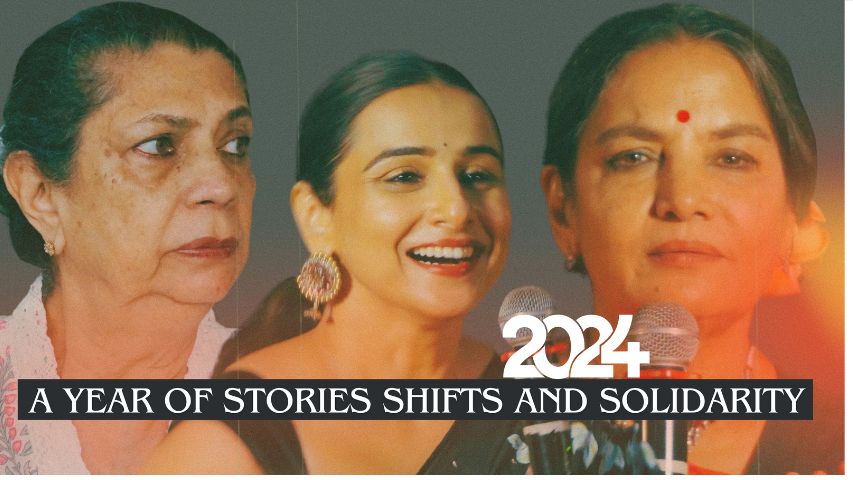
THOUGHT FACTORY: A YEAR OF STORIES, SHIFTS, AND SOLIDARITY
by Vinta Nanda December 31 2024, 12:00 am Estimated Reading Time: 7 mins, 4 secs"2024: A year of cinematic triumphs, societal challenges, and the unyielding spirit of dissent, reminding us of the power of stories to unite, inspire, and confront systemic barriers." Vinta Nanda writes…
Photography: Vinta Nanda
As 2024 comes to a close, it reflects a dynamic blend of artistic milestones and societal reckonings. From Cannes Film Festival accolades for Indian filmmakers to the transformative impact of the Justice Hema Committee Report, the year realised the importance of creativity and activism. Amidst debates on “wokeism,” rising authoritarianism, and global struggles for gender justice, platforms like The Daily Eye highlighted stories that matter. Let’s step into 2025 by preserving our collective memory through film, books, film festivals and independent media that inspire unity and progress.
Politics, Policy, and Patriarchy
The year wasn’t without its share of unsettling developments. The Justice Hema Committee Report remained a touchstone in the fight for gender justice. The Dukhtar-e-Savitri seminar series spotlighted the enduring struggle to translate the report’s findings into actionable reform. Women’s voices continued to rise, even as systemic pushback persisted. In Uttar Pradesh, the State Women’s Commission proposed controversial measures banning male tailors from servicing women and mandating female-only staff in fitness centres. While seemingly aimed at protecting women, these policies threatened to reinforce patriarchal stereotypes rather than dismantle them.
Globally, the US elections ignited debates over “wokeism,” with right-wing rhetoric framing gender and racial equality as extremist ideologies. This discourse spelt a chilling trend of capitalistic forces leveraging social divides to sustain power, diverting attention from pressing economic inequalities.
In India, the intersection of patriotism and profit became evident during the election season. Corporations poured vast sums into election advertising, often targeting platforms they owned or controlled. As Monojit Lahiri observed, "Corporations, recognizing the pivotal influence of media on public perception, manipulate national identity for commercial gain."
Dissent also remained a difficult path. Activists and intellectuals who challenge prevailing narratives often encounter intimidation and violence. Bela Bhatia's experiences highlighted the perils faced by those who advocate for marginalized communities, emphasizing the need for robust protections for dissenting voices in a democratic society.

Cinema and Cultural Resonance
There’s nothing more telling than the X (formerly Twitter) post of parliamentarian from the Shiv Sena UBT Priyanka Chaturvedi, on 30th December 2024, about the Hindi Film Industry after its ghostly silence during the time when the entire nation grieved the passing away of former Prime Minister of India, Dr Manmohan Singh. Here’s how it goes: “The Hindi film industry needs to introspect: they did everything to kowtow to this government in the hope of favour seeking or not being hounded by agencies. They even compromised with their content so as to not ruffle feathers of the powers that be, they took selfies with PM, they attended events of CMs, they did free endorsement to please the government, they made movies to be seen part of the sarkari gang, they hopped state to state for tax free movies, they stayed silent when they needed to speak, they were missing when the entire nation hoped them to be their voice”.
It was a triple feat for Indian talent at the 2024 Cannes Film Festival with Payal Kapadia’s “All We Imagine As Light”, “Sunflowers Were the First Ones to Know” by FTII student Chidananda S Naik, and Anasuya Sengupta of “The Shameless” fame winning major awards in each of the three competitive sections of the prestigious gala. Kapadia, who led a student protest against the appointment of actor-politician Gajendra Chauhan as FTII chairman, earlier won the Oeil d’or (Golden Eye) award at Cannes for acclaimed documentary “A Night of Knowing Nothing,” which premiered under Director’s Fortnight section in 2021.
In this exclusive interview with Shantanu Ray Chaudhuri, Executive Producer Deepti Chawla, who championed The Shameless, discussed her journey in the entertainment industry. From producing acclaimed films like 1971: Prisoners of War to launching Inflixious Content & Art, Deepti shared insights into the challenges of Indian cinema at international festivals.
Voices like Shabana Azmi’s and Vidya Balan’s enriched the year with their reflections on acting, cinema, and life. Their masterclass at MAMI reminded us of the transformative potential of art. Similarly, Anand Patwardhan’s film challenged supremacist ideologies, embodying the essence of Vasudhaiva Kutumbakam in a time of fractious politics.
Such moments weren’t confined to the screen. The Khushwant Singh Literary Festival in Kasauli, co-founded by Nilofer Bilimoria and Rahul Singh, expanded its footprint, weaving stories across borders despite geopolitical tensions. In Shimla, the International Film Festival of Shimla unfolded like a beautiful dream, mixing the charm of the hills with the vibrancy of cinematic arts. Filmmakers like Seema Biswas and Iranian directors lent gravitas to the event, making it a deeply personal and cultural experience.
Cinema remained an anchoring force throughout 2024. The Kadamakudy International Film Festival (KaIFF) debuted with much acclaim, bringing international recognition to films like Hamari Ramleela. Namrata Datta’s Lakshahira celebrated Dr. Lakshahira Das’s legacy, emphasizing the importance of truth-telling for future generations. Documentary filmmaking also made its mark, preserving voices and narratives that challenge the erasure brought by mainstream media. #SHOUT, my own film chronicling 50 years of feminism in India, symbolized both the power of art to disrupt and the suppression it often faces. The pushback from the establishment, through censorship and fear, illuminated the unyielding grip of patriarchal systems on narratives that confront them. Rinki Roy Bhattacharya discussed the inspiration behind the Bimal Roy Award and the challenges of preserving her father’s legacy in an interview with me, and we also celebrated Usha Uthup’s five-decade journey as a musical trailblazer and cultural ambassador.
However, the year was not without its ironies. At the Cannes Film Festival, India's presence was marked by a clean sweep, yet this success paradoxically highlighted the lack of recognition for Indian talent in its home country. As Lahiri aptly put it, "This is India’s clean sweep, with no credit to India at all!"
Preserving Memory in a Fractured World
At its core, 2024 was a year about memory—of preserving stories, honouring voices, and understanding our place in history. Activists like Bela Bhatia reminded us of the stakes involved in preserving these stories against erasure. The debate over the politicization of religion underscored the importance of keeping faith a personal matter to promote social cohesion in a diverse society.
Even amidst the frothy fun of Oktoberfest, and Pitara 1.0, where laughter mingled with music, a deeper sense of community was palpable. In a city as sprawling as Mumbai, these moments of connection felt like tiny revolutions, reminding us that culture thrives not in isolation but in celebration of its diversity. And, when the Jehangir Art Gallery in Mumbai came alive on 10th December 2024 with the grand opening of the retrospective art exhibition celebrating the life and works of Prafulla Dahanukar, one of India’s pioneering muralists and a visionary in the art world, organized by her daughters Gauri and Gopika Dahanukar, we reported on it as well. The opening attracted a distinguished gathering of Mumbai's art fraternity, including luminaries such as Sharyu Doshi, Pheroza Godrej, and Saroj Satija. Prominent cultural figures like Dolly Thakore, Shahbaz and Salim Asgarally were also in attendance.
The suppression of dissent remains a pressing concern. The resilience of democratic institutions has been tested globally. The rise of authoritarian tendencies and the erosion of civil liberties have prompted introspection about the future of democracies. In this climate, the global trend towards authoritarianism emphasises the need for critical discourse, and active participation. As Sharad Raj critiques, “The rapid consumption and dissemination of content have led to the oversimplification of complex issues.” Such oversimplifications threaten the depth and nuance required to address systemic challenges effectively.
As we step into 2025, the lessons of 2024 must guide us. Most importantly, we must nurture spaces for stories—whether they unfold on film, in books, festivals or through independent platforms like the Kashish Pride Film Festival of founders Sridhar Rangayan and Saagar Gupta, or The Daily Eye. These stories are our collective memory and our guiding light. In the face of a fractured, distracted world, they remind us that the threads holding us together are often stronger than the forces pulling us apart.





-173X130.jpg)
-173X130.jpg)
-173X130.jpg)
-173X130.jpg)


-173X130.jpg)
-173X130.jpg)